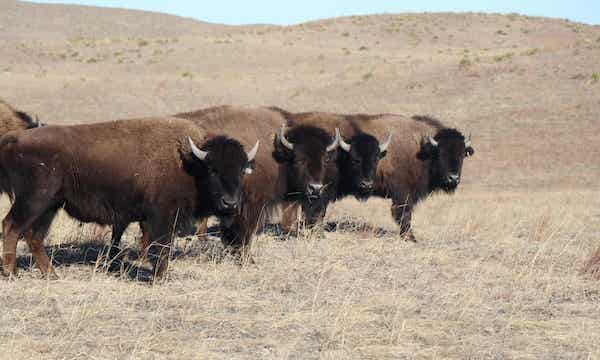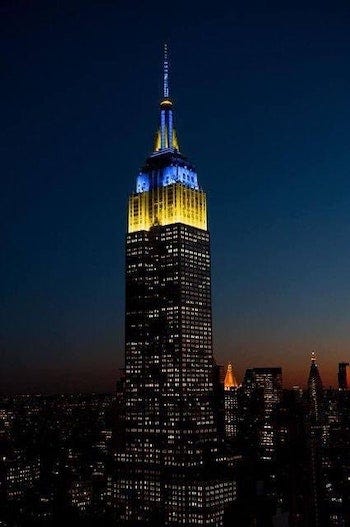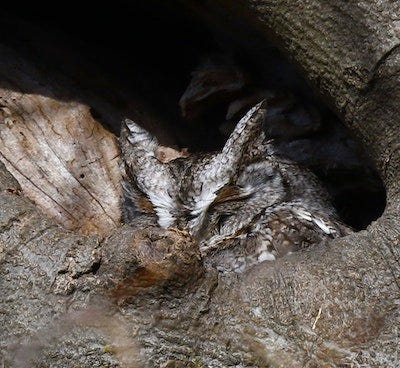The Weird Times: Issue 94, February 27, 2022 (V2 #42)
“As weirdness goes in these very weird times, Feb. 22 might not rate much more than a blip, but it does spark curious notions and a line of existential inquiry: Does it mean everything, or anything, or nothing at all?” —Maura Judkis, Washington Post, 2/22/22
“Public markets synthesize billions of signals every second and distill these bits and emotions into an indifferent number that points to a direction.”—Scott Galloway
“At the end of the day, it will be that common humanity based on the principles of justice that brings us together and enables us to prevail.”—Bernie Sanders, 2.25.22
“The fight is here; I need ammunition, not a ride.” —Volodymyr Zelensky
The most beaten paths lead to the cemetery and water.
You hide only the most precious things in the soil—
the weapon that ripens with wrath,
porcelain hearts of parents that will chime
like the songs of a school choir.
—from [So I’ll talk about it], Serhiv Zhadan, trans by John Hennessy and Ostap Kin in The Calvert Journal: 6 Ukrainian poems that capture a bold moment in contemporary poetry
Putin’s antagonism toward Ukraine was never just about NATO – it’s about creating a new Russian empire, Emily Channell-Justice, Jacob Lassin, The Conversation, 2/23/22
The Coming Energy Shock: Beyond the imminent threat of violence, Russia is poised to upend the global energy market, David Frum, The Atlantic, 2/23/22
How Putin’s Designs on Ukraine Reflect the “Dangerous Nostalgia” of a Lost Empire: At a U.N. Security Council meeting, a speech by Kenyan Ambassador Martin Kimani struck at the heart of the crisis set off by Russia’s aggression, Murtaza Hussain, The Intercept, 2/22/22
Vladimir Putin’s Hall of Mirrors: The Russian president sees the world through the lens of maskirovka and provokatsiia, Timothy Snyder, The Atlantic, 2/21/22: “Just because you live in a house of mirrors does not mean that you can find the exit.’
Vladimir Putin controls the supply chain of western technology, so who is bluffing? Russia has the power to hobble key industries in the US and Europe by restricting supplies of metals, Ambrose Evans-Pritchard, The Telegraph, 2/22/22
Russia Just Seized Chernobyl. Here’s Why It Matters: “A nuclear reactor is a vulnerable source of energy because it relies on peace and stability,” Isabella Dias, Mother Jones, 2/24/22
WHY BIDEN WANTED AMERICANS TO KNOW EXACTLY WHAT PUTIN WAS PLANNING: The president’s diplomatic efforts may have failed at foiling Russia’s attack on Ukraine, but they worked to build global unity and remind Americans, post-Trump, what government is. It’s about “what’s best for the American people, as opposed to our leaders’ personal interests,” one senior administration official says, Chris Smith, Vanity Fair, 2/24/22
A few ways to help Ukrainians: A senseless war of aggression is underway. You can do something, Tim Snyder, Thinking About, 2/24/22
This is how we defeat Putin and other petrostate autocrats: After Hitler invaded the Sudetenland, America turned its industrial prowess to building tanks, bombers and destroyers. Now, we must respond with renewables, Bill McKibben, The Guardian, 2/25/22
The Most Immediate Nuclear Danger in Ukraine Isn’t Chernobyl, James M. Acton, Carnegie Endowment for International Peace, 2/24/22
“He’s a Small Man of Five-Six Saying He’s Five-Seven”: The Psychology behind Putin’s War: Russia expert Nina Khrushcheva and Trump impeachment hero Alexander Vindman explain what is driving Putin’s assault on Ukraine—and how Republicans also have blood on their hands, Emily Jane Fox, Joe Hagan, Vanity Fair, 2/25/22
Putin is playing chicken with the west and asking, just how crazy do you think I am? Russia is now the world's largest terrorist state. We should treat them that way, Lucian K. Truscott IV, Newsletter, 2/26/22
"Genocide" and Genocide: How Putin's atrocity talk leads to atrocities, Timothy Snyder, Thinking About, 2/26/22: “…he plans to arrest the political and civic leaders of Ukraine, carry out show trials, and have innocent people executed.”
Ukraine and the Trumpian Right: For Trump, favoring Putin over Ukraine is personal, and nothing else matters. For Trump’s base, there are other reasons, too, Harold Meyerson, American Prospect, 2/24/22
More Polytix
College faculty are fighting back against state bills on critical race theory: Professors in Texas, Alabama and elsewhere approve resolutions supporting academic freedom, Nick Anderson, Susan Svrluga, Washington Post, 2/19/22
‘The Scheme’: a senator’s plan to highlight rightwing influence on the supreme court: Sheldon Whitehouse spent nine years rousing the Senate to act on climate change. Now he’s set his sights on the changes at the supreme court, David Smith, Washington Post, 2/22/22
Native American tribes sue North Dakota over ‘sickening’ gerrymandering: The suit charges that diluting Native power violates their voting rights and will handicap tribe members who run for office, Hallie Golden, The Guardian, 2/21/22
How an obscure far-right website with 3 employees dominates Facebook in 2022, Judd Legum, Popular Information, 2/23/22
A far-right website created 36 days ago is more popular on Facebook than the Washington Post, Judd Legum, Popular Information, 2/24/22
SCOTUS Will Decide Whether Anti-LGBTQ+ Discrimination Is Free Speech: If the conservative supermajority rules for the plaintiff, it could set us back decades, James Factora, Them, 2/22/22
'The craziest meeting I've ever been to': Ex-Trump aides on SCOTUS Justice Clarence Thomas and wife's bizarre WH visit, Meaghan Ellis, Alternet, 2/23/22: “A former White House aide for former President Donald Trump has revealed details about what she describes as "the craziest meeting" she'd ever attended.”
Science/The Environment/The Future
Is Earth Smart? We came up with a way to measure the intelligence of entire planets. Things aren’t looking great for ours, Adam Frank, Sara Walker, David Grinspoon, The Atlantic, 2/19/22
75% of people want single-use plastics banned, global survey finds, John Geddie, Reuters, 2/21/22
What the latest science says about Antarctica and sea-level rise: The southern polar ice cap is a wild card, Kristen Pope, Yale Climate Connections, 2/23/22
Ocean Plastic Is Bad, but Soil Plastic Pollution May Be Worse: The rise of plasticulture threatens the soil and human health. A new U.N. report spells out what’s needed to end it, Mallory Daily, Civil Eats, 2/23/22
The Surprising Biodiversity Hidden in the World’s Fragile Mangrove Forests: New research finds mangroves host thousands of unique insect species — and these trees are more vulnerable than previously understood, Paul Hornick, The Revelator, 2/22/22
Farmers are overusing insecticide-coated seeds, with mounting harmful effects on nature, John F. Tooker, The Conversation, 2/22/22
Republicans Respond to World-Historical Drought by Propping Up Fossil Fuels: Climate change is ravaging the American West. Lawmakers in those states, meanwhile, want to punish any bank that pulls money from the fossil fuel companies contributing to that climate change, Kate Aronoff, The New Republic, 2/21/22
Can Rights of Nature Laws Make a Difference? In Ecuador, They Already Are: The court’s ruling cheered environmentalists and sent shock waves through the mining industry, which now must prove that projects don’t harm ecosystems or endanger species, Katie Surma, Inside Climate News, 2/21/22
Climate change reports on ‘thought/think’ pieces: Looking for new ways to ponder the challenges posed by climate change? Try starting here, Sue Ellen Campbell, Yale Climate Connections, 2/22/22
A war to halt logging in Northern California reignites. Will it end differently this time? Lila Seidman, LA Times, 2/19/22
Singing in the brain: MIT neuroscientists have identified a population of neurons in the human brain that respond to singing but not other types of music, Anne Trafton, MIT News, 2/22/22
Gene-Edited Brain Organoids Are Unlocking the Secrets of Autism: Harvard researchers used lab-grown clumps of neurons called organoids to reveal how three genes linked to autism affect the timing of brain development, Amit Katwala, Wired, 2/21/22
Africa’s Oldest DNA Is Helping Address Science’s Racial Bias: Scientists have way more DNA from ancient Europeans than Africans. Now analysis of a genome from nearly 20,000 years ago is answering questions about the continent’s past, Matt Reynolds, Wired, 2/23/22
Most Complete Simulation of a Cell Probes Life’s Hidden Rules: A 3D digital model of a “minimal cell” leads scientists closer to understanding the barest requirements for life, Yasemin Sapakoglu, Quanta Magazine, 2/24/22
Any Single Galaxy Reveals the Composition of an Entire Universe: In computer simulations, researchers have discovered that a neural network can infer the amount of matter in a whole universe by studying just one galaxy, Charlie Wood, Wired, 2/20/22: “these researchers have found that a machine learning algorithm can scrutinize a single simulated galaxy and predict the overall makeup of the digital universe in which it exists—a feat analogous to analyzing a random grain of sand under a microscope and working out the mass of Eurasia.”
Revealed: leading climate research publisher helps fuel oil and gas drilling: Elsevier’s work with fossil fuel companies ‘drags us towards disaster’, climate researcher says, Amy Westerveldt, The Guardian, 2/24/22
The state of Arctic ice – and why it matters: The state of ice in Greenland and across the Arctic – both its expanse and its thickness – are important components in evaluating the overall well-being of the planet, Kristen Pope, Yale Climate Connections, 2/24/22
Op-ed: What I Learned from White Oak Pastures—and What Other Farms Can, Too: I saw first-hand the difference intentional, human-powered farming can make for the land—and for the vibrancy of rural communities, Beth Hoffman, Civil Eats, 2/24/22
How a little-discussed revision of climate science could help avert doom: We can reduce global temperatures faster than we once thought — if we act now, Mark Hertsgaard, Saleemul Huq, Michael E. Mann, Washington Post, 2/23/22: “In short, we are not irrevocably doomed — The science we’re referencing was included — but buried — in the United Nations Intergovernmental Panel on Climate Change’s most recent report.”
Plastic pollution is a global problem – here’s how to design an effective treaty to curb it, Sarah J. Morath, The Conversation, 2/24/22
2022: 10 Breakthrough Technologies, MIT Technology Review, February 2022.
September, 1918
This afternoon was the colour of water falling through sunlight;
The trees glittered with the tumbling of leaves;
The sidewalks shone like alleys of dropped maple leaves,
And the houses ran along them laughing out of square, open windows.
Under a tree in the park,
Two little boys, lying flat on their faces,
Were carefully gathering red berries
To put in a pasteboard box.
Some day there will be no war,
Then I shall take out this afternoon
And turn it in my fingers,
And remark the sweet taste of it upon my palate,
And note the crisp variety of its flights of leaves.
To-day I can only gather it
And put it into my lunch-box,
For I have time for nothing
But the endeavour to balance myself
Upon a broken world. —Amy Lowell
What Moves Us Forward
Ideas to change the world: Margaret Atwood talks to seven visionaries fighting for a brighter future: The author’s hand-picked panel share their ideas on music, mushrooms, zombies and more, Hadley Freeman, The Guardian, 2/19/22
‘It’s a powerful feeling’: the Indigenous American tribe helping to bring back buffalo: The Rosebud Sioux nation in South Dakota aims to build the largest Indigenous owned herd to help food security and restore the land, Matt Krupnick, The Guardian, 2/20/22

Inside a former S.F. church, a battle for the future of knowledge, Barbara Lane, SF Chronicle Datebook, 2/21/22
When Science Fiction and Fantasy Envisions Life Beyond Capitalism: A syllabus of SFF novels that imagine different ways of living, Lincoln Michel, Counter Craft, 2/23/22
What the Haunting ‘Inner Passage’ Represented to the Enslaved: These photographs explore the waterways of the South that brought suffering to so many and also provided some a way out of bondage, Imani Perry, Smithsonian Magazine, March 2022
In his new memoir, Harvey Fierstein asks, “What’s the harm of looking back?” Frank Rizzo, Connecticut Magazine, 2/21/22: I Was Better Last Night
How California’s Waterways Gave Life to Indigenous Communities, Greg Sarris, LitHub, 2/25/22: “The indigenous people did not think of the river as a 110-mile body of water as a geographer might. They didn’t conceive of it as a single unit or phenomenon but rather as a continuum of interconnected places, no different from the way they understand all features of the wider landscape, each with its own character and story. The storied landscape thus is a sacred text, an outcropping of rocks, a mountain peak, the river mouth, all mnemonic pegs reminding us not only of the world we find ourselves in but of how to live harmoniously with it.”
My Grandmother was born in Chernigov
Not far from Chernobyl
Just one of the many reasons
I am thankful
She left that place when she was a child
Her family
Like Shalom Aleichem’s family
Fled Ukraine
Right around the time of terrible pogroms
After the 1905 Revolution
—from “Sitting in Westport Watching My Seven Year-Old in Fiddler on the Roof,” Dan Burstein
A Little Bird Talk
Why P.E.I. has been seeing more robins this winter: More robin sightings are likely related to warmer winters, but that's not the only reason, Thinh Nguyen, CBC, 2/16/22
Fight or flight? How birds are helping to reveal the mysteries of evolution: A blend of natural and sexual selection sent birds skyward, UMass Amherst, Science Daily, 2/24/22
Why are there no birds that hibernate? Bill Naylor, New Scientist, 2/23/22: “Just one bird species is known to fully hibernate: the common poorwill.”
Following the inner compass: How birds find their ways to foreign lands: Head direction cells in the brains of streaked shearwater chicks might act like internal compasses to help the birds navigate during their initial migratory flight, Doshisha Univ, Eurekalert, 2/22/22
New Feature: Read of the Week (in which Ed. makes a suggestion – if you only have time to read one of the many pieces here, read this one: A moment of clarity: The Russian invasion of Ukraine should wake us up, Noah Smith, Noahpinion, 2/25/22: “Out here in the wider world, though, the Russian invasion is sparking a needed moment of clarity. For the last two decades we’ve been sleepwalking through various dreams of our own creation, willfully blind to the dangers that were gathering out in the real world. It is time for those dreams to end now. The alarm clock is ringing.”
Understanding the Ukraine Crisis: A Comprehensive Reading List, Henrikas Bliudzias, LitHub, 2/24/22: “You can’t escape politics when you live in Eastern Europe.” The Gates of Europe, Serhii Plokhy; Red Famine, Anne Applebaum; The Ukrainians: Unexpected Nation, Andrew Wilson; In Wartime, Tim Judah; A Short History of Russia, Mark Galeotti, Putin’s People, Catherine Belton; This is NOT Propaganda by Peter Pomerantsev; Between Two Fires, Joshua Yaffa
“I wish it need not have happened in my time,” said Frodo. “So do I,” said Gandalf, “and so do all who live to see such times. But that is not for them to decide. All that we have to decide is what to do with the time that is given to us.” – J.R.R. Tolkien
“War is an ugly thing, but not the ugliest of things: the decayed and degraded state of moral and patriotic feeling which thinks that nothing is worth a war, is much worse. When a people are used as mere human instruments for firing cannon or thrusting bayonets, in the service and for the selfish purposes of a master, such war degrades a people. A war to protect other human beings against tyrannical injustice; a war to give victory to their own ideas of right and good, and which is their own war, carried on for an honest purpose by their free choice, — is often the means of their regeneration.” –John Stuart Mill
Please don't leave me in the morning
Tell me everything is gonna be right
I said oh baby, don't leave me alone
This Saturday night
Oh please don't leave me in the morning
Tell me everything's gonna be right
I said oh please, please don't leave me alone
This Saturday night
—from “Knock Knock” by Ukrainian band Brunettes Shoot Blondes
Zelynsky speaks to the Ukrainian people, 2/24/22
The times are getting weirder by the day. But the future is still an open door.
“May you be at peace, May your heart remain open. May you awaken to the light of your own true nature. May you be healed. May you be a source of healing for all beings.”
Love to all. —David






